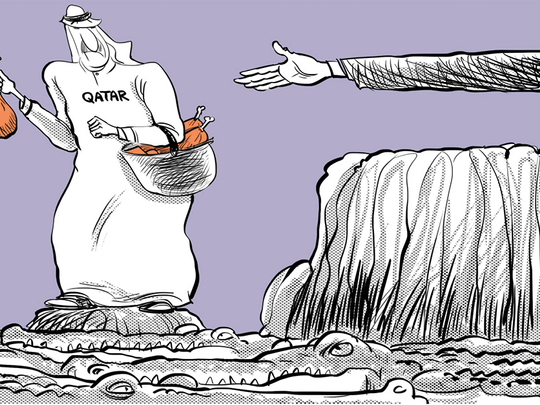
The stalemate between the Saudi-led anti-terror quartet and Qatar continues to generate much global concern. United States’ diplomacy is moving full-throttle ahead in a bid to help solve the Qatar-Gulf stand-off. Recently, US Secretary of State Rex Tillerson had sent two envoys to the Gulf to find a solution to the crisis. US Deputy Assistant Secretary of State for Arabian Gulf Affairs, Tim Linderking, accompanied retired General Anthony Zinni to find a way out of the impasse that has marred the Gulf region. While this proves America’s commitment to find a way out of the embattled relations, signals from Doha have thus far been negative.
The new diplomatic approach is aimed at giving greater support to the Manama meeting of the foreign ministers of Saudi Arabia, UAE, Bahrain and Egypt, which called for dialogue with Qatar under the condition that it will promise to stop supporting terrorism. A positive gesture by Doha at this point would have de-escalated the situation to a great extent. However, Qatar is sticking rigidly to its stances despite the overtures being made.
Instead of keeping the dispute with “local” boundaries to be solved within the “Gulf house”, it has taken the unusual step of complaining to the United Nations Secretary-General, Antonio Guterres, and the World Trade Organisation, filing complaints with the latter that the so-called ‘embargo’ imposed by the anti-terror quartet violates the laws and conventions of its trade relations.
Doha is only attempting to escalate, up the ante and contribute to the deadlock. Instead of attempting to cool things down and take advantage of new doors being opened in Manama, and ending the dispute, it is pleading absolution, only to raise temperatures and possibly a split in the Gulf Cooperation Council (GCC). In the face of such developments, the anti-terror quartet is unable to stand with its hands tied behind its back. It too has appealed to the UN Security Council, through the UN Counter-Terrorism Committee, which Egypt is a chairman of, to highlight Qatar’s support for terror groups.
Notwithstanding Qatar’s obstinacy, the anti-terror quartet is still trying for a way out of the current stalemate.
Through these measures, it appears that the quartet wants to do more, get things moving again, but its efforts are being effectively held back because of a lack of positive response from the other side and the fact that the quartet and the world continues to discover more unsavoury links between Qatar and terrorism. Shortly before the Manama meeting, the quartet had revealed an further 18 organisations and individuals who were implicated with terror outfits and extremist individuals in the region. This is an additional component to the terror list of 59 individuals and 12 organisations that the quartet wants Qatar to deal with and address effectively.
But be that as it may, the quartet is still willing to walk that extra mile and give Qatar the benefit of the doubt, calling on it to demonstrate its intensions of not financing terror and radical groups in the Middle East. It’s really up to Doha now to respond positively and see what can be done because the new stand represents a great opportunity from both sides of the divide.
Qatar is still unwilling to take advantage of the new developments. It should realise that it has to move forward, instead of harking back. Among the new positive developments is the issue of the Haj, the annual Islamic pilgrimage coming up on August 30. Saudi Arabia has stated that it would welcome pilgrims from Qatar, but the latter’s Human Rights Committee claimed that Qatari nationals were being restricted to enter Saudi Arabia from only two airports and that it was mandatory for them to come only through Doha.
However, the issue here is surely access to the holy rituals in Makkah. Why should it matter where people come from? During Haj, Saudi Arabia prepares for the pilgrimage in a systematic and organised manner and there are restrictions to preserve security and stability, in the interest of all visitors to the country. The Saudi arrangements do not really target any specific group. In the light of the heated situation, Qataris should appreciate the fact that the Saudis are welcoming Qatari pilgrims for Haj.
The anti-terror quartet is trying its best to get things moving with Qatar in the right spirit. However, the bloc has made it very clear that normalisation of relations is contingent upon Doha honouring the 13-point demands set by the quartet to curb terrorism. There was earlier a confusion about whether these have been “shrunk” to six, but the foreign ministers of the quartet have said that all the conditions must be implemented so that dialogue can take place with Qatar. Eventually, Doha has to sit down and talk with the quartet. The art of dilly-dallying and stalling, that Qatar seems to have mastered, will only lead to further isolation of the country from the global community.
Marwan Asmar is a commentator based in Amman. He has long worked in journalism and has a PhD in Political Science from Leeds University in the UK.









